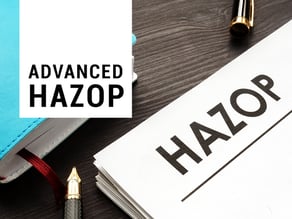Process Safety Blog
Why do you need a professional HAZOP scribe ?
Much like how an experienced facilitator is critical to the success of a HAZOP, so too is the need for a competent scribe with the appropriate technical background. You could have the best facilitator in the world running a HAZOP with a great team and all the information on the project you could ever ask for, but still get a poor outcome with the wrong scribe. At the end of the day, if it wasn’t written down, it didn’t happen.
My first time scribing a HAZOP
Thinking back to the first HAZOP I ever scribed for, I was incredibly lucky. I was fresh out of University, with no real experience with actual processing facilities outside of a couple of summer internships. After a couple of days into my new and exciting graduate position, I was informed that I would be scribing my first HAZOP.
I was nervous about the workshop; however, it ended up going well and a positive result was achieved. I know this wouldn’t have been the case for many new scribes, not because I am a fantastic engineer with skills far beyond my years (although let’s not rule out that played a part), but because my employer had made sure I would be properly trained and have great support should I need it.
Before my first HAZOP session, I had been taken through an excellent HAZOP Participants training course, which taught me what is expected of a scribe during the review.
On the day itself, I was paired up with a very well-qualified and experienced facilitator whom without his help, the session would have gone entirely differently. This person had been running HAZOPs since well before I was born and knew exactly what to do to ensure my lack of experience would not hinder the outcome of the review. Unfortunately, not all HAZOPs can be run by industry veterans, and even experienced facilitators cannot facilitate and scribe at the same time effectively (a topic for another day). Scribes need to do their job, and they need to do it well.
That experience with my first HAZOP made me appreciate the responsibilities of a scribe, and how they are certainly more than just word-for-word transcribers of a meeting.
|
|

|
|
| INCREASE YOUR KNOWLEDGE by purchasing our HAZOP Participants E-Learning HERE! | Find out about our upcoming HAZOP LEADER Training Course HERE! | For those more experienced, we offer an ADVANCED HAZOP Training Course HERE! |
What makes a professional Scribe?
There are several requirements for what I would consider a professional scribe. I’ve listed what I believe are the most critical ones.
A strong technical background: A scribe needs to have the right technical knowledge and experience to be able to effectively understand the discussions that are going on during a HAZOP. They need to be able to effectively speak the same ‘language’ in technical terms to be able to record something that makes sense. This person would typically be a process or mechanical engineer with some form of relevant industry experience.
Excellent language skills: HAZOP discussions need interpreting to get the right information written down in the right format. Causes, consequences and safeguards all need to be teased out from sometimes very fast-paced discussions, and then written in such a way that someone could pick up the minutes 6 months later and understand exactly what was talked about. If we write down word for word exactly what is said during a HAZOP, the minutes and final report would be gibberish.
They must be a fast typist: Never underestimate the benefits of having a touch typist as a scribe. Waiting quietly for someone to finish poking at their keyboard with their two index fingers after every single line item tends to put participants to sleep or onto other tasks.
Telepathic communication with the facilitator: This one can be best described as having a well-developed relationship between the scribe and the facilitator. Understanding the nuances of someone’s communication style can make the scribing process run so much smoother. For example, a scribe should be able to understand and anticipate what a facilitator wants to be recorded without needing them to spell it out.

What else does a professional scribe do?
There’s more a scribe can contribute to a HAZOP than just recording the minutes. Having written everything down without the distraction of actively participating in the discussions lets the scribe get a good perspective on what’s already been considered, how it's been considered, and what conclusions came of it.
Keeping things consistent: The scribe is completely focused on recording all the key points, so they are in a great position to ensure everything is kept consistent and that what was said and concluded yesterday is not forgotten. This contrasts with the facilitator who is actively keeping the team on track and leading discussions, which can sometimes make it difficult to recall exactly what was recorded the day before and what conclusions had come from it.
Writing the narrative for the review: If it wasn’t recorded, it never happened. Scribes write the narrative for the HAZOP, it's important to appreciate that the way language is used can make the same point mean something entirely different. A good professional scribe will ensure the language used is appropriate for the minutes. I’ve written a good example of this applied to a HAZOP action below:
Option 1 – from a novice scribe: Consider installing a relief valve on the big receiver next to the engine room.
Option 2 – from a professional scribe: Install an adequately sized relief valve on receiver V-001 to protect against over-pressuring the vessel from blocking it in.
The first option could be interpreted as someone only needing to consider doing something. Not requiring anything to be carried out. It also does not adequately identify which receiver is being referred to.
Writing the HAZOP report: A professional scribe will also usually write the report, with a review by the facilitator. This can help reduce the cost of external parties running a HAZOP as the facilitator is no longer required to write the entire report.
HAZOP preparation checklist: We have developed a HAZOP preparedness checklist that we use when running HAZOPs for clients. This checklist helps to ensure everything is ready on the day for a HAZOP workshop to run smoothly and efficiently.
Ready to take your process safety strategy to the next level?
Learn how to guide high-quality, structured workshops with our HAZOP Leader Training. Build confidence to lead effective HAZOPs and strengthen your facility’s risk management with our Advanced HAZOP Training.
Have questions or need guidance? GET IN TOUCH. We're here to help.


